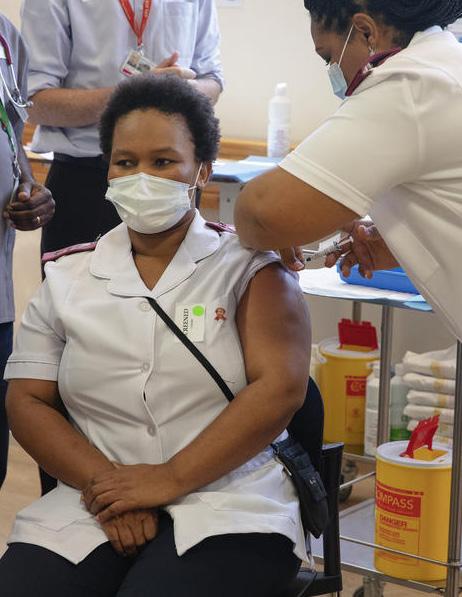
5 minute read
Communiqeu
CorporateDispatchPro
KEITH ZAHRA
TECHNOLOGY
Vega: The first world-class supercomputer in the EU
The European Commission together with the European High-Performance Computing Joint Undertaking has launched the operation of the Vega Supercomputer in Maribor, Slovenia. This marks the launch of the first EU supercomputer procured jointly with EU and Member State funds, with a joint investment of €17.2 million.
The new Vega supercomputer is capable of 6.9 Petaflops of computer power and will support the development of applications in many domains, such as machine learning, artificial intelligence, and highperformance data analytics. It will help European researchers and industry to make significant advances in bio-engineering, weather forecasting, the fight against climate change, personalised medicine, as well as in the discovery of new materials and drugs that will benefit EU citizens.
The EuroHPC Joint Undertaking pools European and national resources to procure and deploy world-class supercomputers and technologies. In addition to Vega in Slovenia, EuroHPC supercomputers have been acquired and are being installed in the following centres: Sofia Tech Park in Bulgaria, IT4Innovations National Supercomputing Center in Czechia, CINECA in Italy, LuxProvide in Luxembourg, Minho Advanced Computing Center in Portugal, and CSC – IT Center for Science in Finland.



CorporateDispatchPro
KEITH ZAHRA
HUMANITARIAN AID
EU launches €100 million fund to support vaccination in Africa
The EU has formally launched a €100 million humanitarian initiative in support of the COVID-19 vaccination campaigns in Africa. As announced by the President of the European Commission, Ursula von der Leyen, at the G7 meeting in February 2021, this €100 million initiative is part of the European Commission’s efforts to ensure equitable and fair access to safe and effective vaccines to all.
By joining forces with the Africa CDC and other international partners, the European Commission aims to support a fast and safe rollout of Covid-19 vaccines in Africa.
This EU initiative, with a steering role of the Africa CDC, will support two complementary dimensions of the vaccination campaigns in Africa: One track of indicative €25 million in funding will aim to support the rollout of the vaccination campaign in African countries. This will include the support for capacity building of national health authorities and health care workers as well as the support to managing the information and coordination platform on vaccination. It will also address critical logistical gaps, including equipment. This implementation at country and continental level will ensure better and independent monitoring of the rollout of the COVID-19 vaccination campaigns across Africa, supporting Africa CDC’s ongoing work. From a long-term perspective, it would also seek to reinforce national health systems’ resilience to address future epidemic outbreaks.
The second track of an indicative €65 million in funding aims to support the rollout of vaccination campaigns in specific humanitarian settings, notably in conflict and hard-to-reach areas, implemented through needs-specific activities, in close cooperation with various EU humanitarian partners. A further €10 million is in reserve, to be allocated to any of two tracks as needed.



CorporateDispatchPro
KEITH ZAHRA
CITIZENS’ RIGHTS
The European Commission has launched a public consultation on the electoral rights of mobile EU citizens, as part of the follow-up of the 2020 Citizenship Report. The electoral rights of mobile EU citizens are included in the directives on the exercise of the right to vote and stand as a candidate in elections to the European Parliament as well as in local elections, for citizens of the Union residing in a Member State of which they are not nationals of.
The results of this public consultation will feed into the Commission’s proposal to revise the Directives on the electoral rights of mobile EU citizens.
Vice-President Věra Jourová said that the essence of democracy is the right to vote for everyone: “This is why we want to help securing this right. EU citizens who live in another EU country also have the right to vote and stand as candidate in local or municipal elections - under the same conditions as the nationals of that country.”
The legislative proposal for the revised Directives is expected by the end of 2021. The public consultation will gather experiences and opinions on the electoral rights of mobile EU citizens. It is addressed to all interested stakeholders, including the general public, civil society, academia and research institutions, local and national authorities, as well as communication companies and other businesses. The public consultation is available here and will be open until 12 July 2021.



CorporateDispatchPro
KEITH ZAHRA
FOREIGN POLICY
Arms Trade Treaty: EU steps up support in fight against illicit arms trade
The EU will provide new funding for the effective implementation of the Arms Trade Treaty (ATT). The Council has adopted a decision allowing the EU to support three projects of the ATT Secretariat in Geneva with a contribution of €1.37 million.
The aim is to help states party to the treaty strengthen their national arms export control systems. Export control systems are key instruments for preventing the diversion and illicit trade in arms and contribute to more responsible trade in military equipment and technology.
More specifically, the EU’s support will support training local and regional ATT experts to deliver implementation assistance and reduce reliance on external consultants as well as building IT and communications mechanisms to enable more effective cooperation between states parties’ points of contact and the ATT Secretariat.
The project also strengthens the ATT Secretariatʼs institutional capacity to provide sustainable support to the state’s parties. It fits within the recently adopted strategy to strengthen the EUʼs contribution to rulesbased multilateralism, by promoting global peace and security.








